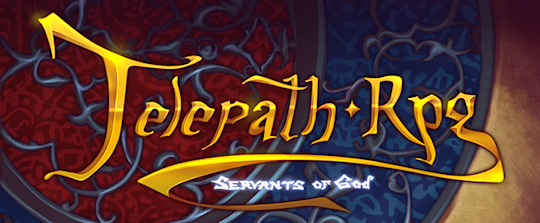I read this extremely interesting article yesterday courtesy of Erin Robinson. It is helping me to work through a particular issue I’ve been facing in writing the story for Telepath Tactics.
So here’s the thing.Women are traditionally underrepresented in RPGs (and when represented, are represented in stereotypical roles where they nearly always avoid front-line fighting, such as healer, archer or mage). I don’t want to just hold a fig leaf over this issue–I want to really subvert it. I did some of this in Telepath RPG: Servants of God, but I know that I can do better.
Thus, I made a decision early on to go whole-hog with female representation in the Telepath Tactics single player campaign. At the start of the campaign, two of your three toughest melee brawlers are women. In fact, women currently comprise the clear majority of the playable characters in the game. (And rest assured, not one of them wears boob plate!)
The wealth of female protagonists in Telepath Tactics has presented me with an interesting challenge in writing the game’s dialog, however, one which I failed to properly anticipate. As in any game I make, I want my characters to be interesting; I want to give them motives that drive interesting conflicts in the story. Doing that well means giving them convincing relationships with one another.
Here’s the problem. Because so many of the characters are women, I have to write convincing relationships between them. However, I’m not really privy to the intimate details of woman-woman relationships in my life. Women behave differently without men around; I’ve heard this roughly a million times from a million different women whom I trust. I have no reason to disbelieve them. But this poses a conundrum: how do I write female-female relationships without real-life experiences of those relationships to draw upon?
Someone on Twitter suggested that I could write women characters just by treating them as if they were men. I don’t think this is the solution. As an author, I always try to place myself in the shoes of my characters. Women and men are similar in a lot of really significant ways, but I’d have to be naive to think that there is no difference between the two in terms of how they interact with members of the same gender. I want the women in Telepath Tactics to feel like real people, not just like men with boobs. That means writing the characters in an authentic way.
Without life experience to draw upon, it can be awfully easy to slip into stereotypes. Or, if you’re like me and are excessively concerned about avoiding stereotypes, it can be easy to go too far out of your way to subvert them! I may have done this in my last game. Rahel was something of a “strong woman.” There, I admit it. She had many facets to her that made her much more interesting than your standard-issue Marcia Fenix–but even so, a lot of her personality sprang from a pervasive sense of I-must-subvert-the-stereotypes.
Moving forward, I am trying my best to chart a course between the Scylla of stereotypical women and the Charybdis of women who swing so far in the other direction that they have become their own stereotype. How does one navigate these waters?
This issue actually came up during a Q&A at the conclusion of a feminism panel at Indiecade. The actual question may have been phrased with regard to gay or transgender characters, but the basic issue was the same: how does someone write characters of other backgrounds convincingly? Anna Anthropy offered a concise solution: hire someone with the required background to write the story.
This is a good solution for large studios, to be sure, ones that have the resources to hire an outside writer. Currently, I do not. And besides: I personally want to grow as a writer, not simply run off and hire someone else the moment I have to stretch my abilities!
So I’m giving this my best shot. And in so doing, I’ve found this article quite helpful in fashioning a better approach to portraying relationships among women. Here is my favorite part of the piece:
“Strong women characters” are a canard. They refer to the old-fashioned “strong, silent type,” a type that tolerates very little blubbering, dithering, neuroticism, anxiety, melancholy or any other character flaw or weakness that makes a character unpredictable and human.
The absurdity of the strong-female-character expectation becomes apparent if you reverse it: Not only does calling for “strong male characters” sound ridiculous and kind of reactionary, but who really wants to watch them? They sound boring. In fact, traditional “strong male characters” have been almost entirely abandoned in favor of male characters who are blubbery, dithering, neurotic, anxious, melancholic or otherwise “weak,” because this weakness is precisely what makes characters interesting, relatable and funny.
Women do not merely exist along a continuum of “weak” to “strong”; I’ve always known that, of course, but Ms. Chocano’s article has helped me give myself permission to stop obsessing about it and start thinking about the weird little quirks that make the women I know in real life so unique. I still don’t know if I’ll succeed in portraying relationships among women well, but I’m giving it my best efforts. We’ll see how it all pans out.






